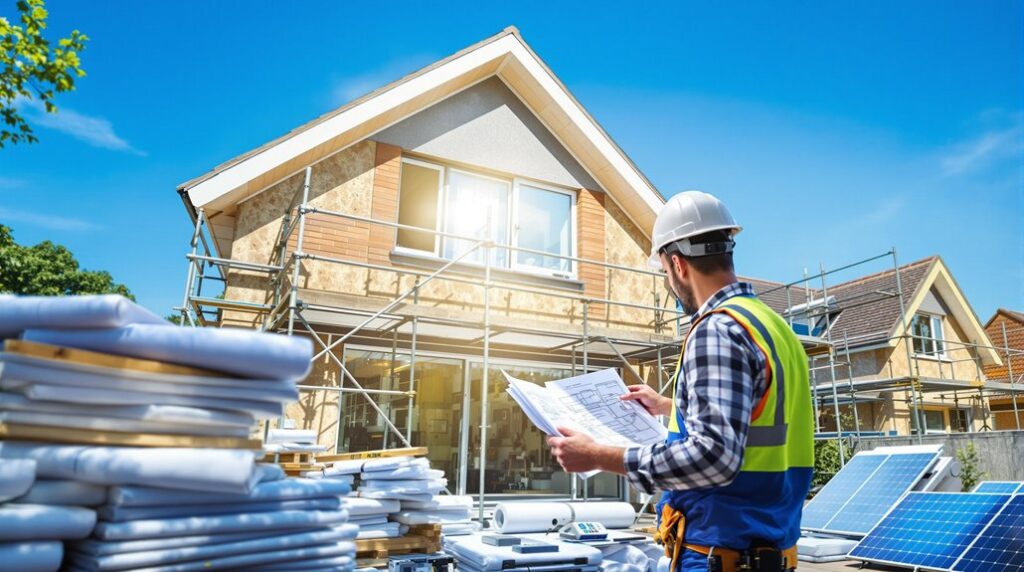I’ve been tracking the upcoming 2030 property regulations, and if you’re planning renovations, you can’t afford to ignore what’s coming. The government’s pushing hard for minimum EPC C ratings across rental properties, and these standards will likely expand to all residential buildings. Here’s what concerns me most: many homeowners are making costly renovation decisions today without considering compliance requirements that’ll hit in just six years, potentially leaving their investments stranded.
Key Takeaways
- Achieve EPC C rating by 2030 through comprehensive insulation upgrades to avoid £5,000 fines and rental restrictions.
- Install heat pumps and renewable energy systems before gas boiler phase-out after 2025 for compliance.
- Upgrade to triple-glazed windows with U-values ≤0.8 W/m²K to meet 2025 Future Homes Standard requirements.
- Follow PAS 2035:2023 whole-house approach using certified retrofit coordinators for cohesive, compliant property improvements.
- Plan phased renovations to access 5% VAT rates and government schemes while increasing property values significantly.
Understanding the New EPC Rating Requirements and Compliance Deadlines
As regulatory pressure intensifies across the UK property sector, landlords face unprecedented compliance challenges that will fundamentally reshape rental market dynamics. You’re now required to achieve EPC C ratings for all rental properties by 2030, up from the current E minimum. This affects 2.6 million UK rental properties currently below standard. It’s crucial to ensure that any decorating work complies with landlord decorating guidelines, as these changes may influence your property’s energy efficiency.
I’ll walk you through what’s coming: interim milestones for new tenancies, potential EPC validity reductions from 10 years, and stricter commercial property requirements. With 60% of private rental sector homes rated D or below, you’re part of a community facing significant upgrades.
The stakes are high—£5,000 fines per non-compliant property, rental restrictions, and reduced valuations await those who don’t prepare. However, tenants increasingly value energy efficiency, with 66% of tenants considering EPC ratings when choosing rental properties. Start planning now.
Prioritizing Insulation Upgrades to Meet Building Regulation Standards
Meeting those EPC C ratings by 2030 requires strategic upgrades that deliver measurable results, and insulation forms the foundation of your compliance strategy. I’ll guide you through the technical standards that matter most for your renovation success.
Your roof insulation must achieve 0.16 W/m²K for retrofits—less stringent than new builds but still demanding proper execution. Since uninsulated roofs account for 20% of heat loss, this upgrade delivers immediate impact. Proper insulation is crucial for maximizing thermal efficiency in your home. Wall insulation follows the same principle: when you’re replacing 50% or more of any thermal element, the entire element must meet current regulations.
The whole-house approach under PAS 2035/2030:2023 guarantees your upgrades work together cohesively. This all-encompassing strategy prevents costly mistakes and maximizes your investment’s long-term value while positioning your property for future regulatory changes. With gas boilers being phased out after 2025, your insulation upgrades become even more critical for maintaining efficiency with alternative heating systems.
Optimizing Heating Systems and Renewable Energy Integration

While insulation creates the thermal envelope, your heating system determines how efficiently you’ll maintain comfortable temperatures and achieve those essential EPC C ratings. I’m prioritizing heat pump integration during renovations because they’ll cut heating emissions by 70% versus gas boilers while positioning your property for the government’s 2030 EPC C mandate. Additionally, heat pumps often lead to lower operating costs due to their superior efficiency compared to traditional systems.
During kitchen upgrades, I’m installing induction hobs to enable complete gas disconnection, saving £100 annually in standing charges. I’m ensuring plumbing and electrical layouts accommodate heat pump specifications now, avoiding costly retrofits later. Space allocation for outdoor units is critical—I’m designating garden or wall areas during planning phases.
The government’s Boiler Upgrade Scheme provides essential financial support to offset installation costs, making heat pump transitions more affordable for property owners. With grants available and penalties reaching £30,000 for non-compliance, heat pumps aren’t just environmental upgrades—they’re essential investments protecting your property’s value and rental viability.
Strategic Financial Planning for Phased Property Improvements
Property renovation success hinges on strategic financial planning that transforms costly upgrades into profitable investments. I recommend implementing phased improvements that target achieving minimum EPC C rating by 2030, ensuring you’ll comply with UK regulations while maximizing your ROI through increased property values and rental demand. Additionally, thorough energy assessments can help identify the most effective upgrades for your home.
You’ll benefit from leveraging reduced VAT rates of 5% on retrofit-led renovations and exploring Green Deal subsidized loans attached to your property. I suggest incorporating long-term planning that considers future family dynamics like home offices or multigenerational living arrangements.
Your sustainable renovations will reduce operational costs through energy savings while addressing the critical need to decarbonize construction’s 40% contribution to global CO2 emissions. Higher EPC ratings can increase property values by up to 14%, making your investment financially rewarding beyond mere compliance. This approach positions you ahead of regulatory changes.
Building Envelope Enhancement Strategies for Long-Term Efficiency
Since buildings account for 40% of global carbon emissions, your envelope enhancement strategy becomes the cornerstone of achieving the UK’s mandated 24% GHG reduction by 2030.
I’ll guide you through the five critical elements that’ll future-proof your property. First, prioritize high-performance insulation achieving U-values ≤0.15 W/m²K and airtightness testing below 5 m³/(h·m²) at 50 Pa—this combination cuts heating demand by 20% annually. Additionally, consider how extension expenses can affect your overall renovation budget. Second, install triple-glazed windows with U-values ≤0.8 W/m²K to meet 2025 Future Homes Standard requirements.
Third, integrate overheating mitigation through external shading and natural ventilation strategies. Fourth, embed renewable systems like solar PV generating 1,000 kWh/year per kWp. Finally, guarantee PAS 2035:2023 compliance through certified retrofit coordinators and moisture risk assessments for all funded projects.
Beyond these core improvements, consider the embodied carbon impact of your chosen materials, as regulations increasingly scrutinize embodied carbon alongside operational efficiency to meet comprehensive sustainability targets.
Conclusion
I’ve outlined the essential steps you’ll need to take to future-proof your property for 2030’s EPC regulations. Focus on achieving that minimum C rating through strategic insulation upgrades, heat pump installations, and renewable energy integration. Don’t tackle everything at once—phase your improvements to spread costs and maximize impact. Remember, compliance isn’t just about meeting regulations; it’s about protecting your property’s value and reducing your long-term energy costs effectively.
References
- https://www.landlordtoday.co.uk/features/2025/02/is-this-how-landlords-can-meet-new-epc-regulations/
- https://www.uwindsor.ca/secretariat/sites/uwindsor.ca.secretariat/files/pdc250514p_-_combined_may_14_2025_pdc_package_0.pdf
- https://library.gbpn.org/library/rp-detail-pages/uk-renovation-policy
- https://www.nrla.org.uk/news/the-upcoming-epc-changes-what-landlords-need-to-know
- https://www.edgetechig.co.uk/new-future-homes-standard
- https://www.cbre.co.uk/insights/articles/2030-epc-deadline-a-turning-point-for-the-private-rented-sector
- https://www.julianwadden.co.uk/about-julian-wadden/insights/how-to-get-your-rental-property-epc-ready-for-2030/
- https://www.gov.uk/government/consultations/reforms-to-the-energy-performance-of-buildings-regime/reforms-to-the-energy-performance-of-buildings-regime
- https://www.landlordstudio.com/uk-blog/how-to-future-proof-your-rental-business-from-big-changes-like-epc-regulations
- https://thebla.co.uk/guide-epc-regulations-for-uk-rental-properties-2025/

